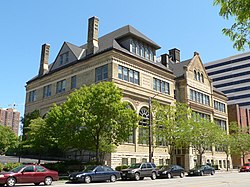German-English Academy Building
|
German-English Academy
|
|

German-English Academy Building
|
|
| Location | 1020 N. Broadway Milwaukee, Wisconsin |
|---|---|
| Built | 1891, 1892 |
| Architect | Crane and Barkhausen |
| Architectural style | Romanesque Revival |
| NRHP Reference # | 77000037 |
| Added to NRHP | April 11, 1977 |
The German-English Academy Building is a school built in Milwaukee, Wisconsin in 1891 to house the German-English Academy, which later became the University School of Milwaukee. The Academy played an important role during a time when Milwaukee was known as "the most German city in America." The building is listed on the National Register of Historic Places and is now owned by the Milwaukee School of Engineering.
In 1851 some of Milwaukee's wealthy German immigrants formed the Milwaukee Schulverein (School Association). Many of the founders were Forty-Eighters, progressives who had left Germany after the German revolutions of 1848–49 failed. Unhappy with Milwaukee's public schools, and wanting instruction in German as well as English, they started a private school called the German-English Academy. Aside from teaching German, the Academy brought in other ideas from German education at the time: singing, drawing and domestic science classes; physical education based on the German Turner movement. In 1873 the Academy offered the first kindergarten in Milwaukee. Classes initially met in the home of Peter Engelmann, the first teacher, but soon outgrew that.
In 1891-1892 a new home (pictured) was built for the school, with two blocks. The Pfister/Vogel family financed the southern classroom block (on right in photo). It is 3.5 stories, in Romanesque Revival style, with a limestone foundation, cream-brick walls, bands of windows, small towers on the corners, small arcades, and a hip roof. The Milwaukee Turner Society funded the northern gymnasium block (on left) which is similar, but with arcades of large windows to let light into the gymnasium, and with towering chimneys. Designs on the gymnasium's terra cotta spandrels depict Indian clubs, foils, and other Turner athletic equipment. Both blocks were designed by Charles D. Crane and Carl C. Barkhausen (a former student of the Academy), achieving a unified design.
...
Wikipedia
